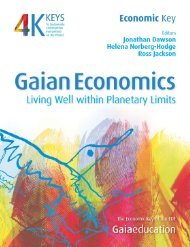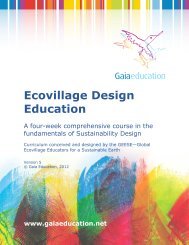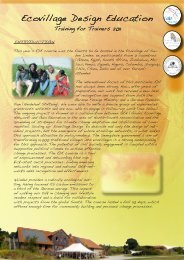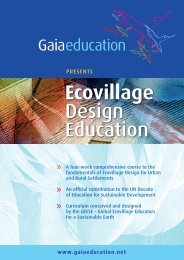Designing Ecological Habitats - Gaia Education
Designing Ecological Habitats - Gaia Education
Designing Ecological Habitats - Gaia Education
Create successful ePaper yourself
Turn your PDF publications into a flip-book with our unique Google optimized e-Paper software.
248 <strong>Designing</strong> ecological <strong>Habitats</strong><br />
problems, and only in such a world are all the notes of nature’s song sung.<br />
Integral Ecology is committed to the complexity and multidimensionality<br />
of this world in its entire mysterious splendor. Integral Ecology supports<br />
us in becoming increasingly reflective of what we are looking at, who we are<br />
as we are doing the looking, and how are we looking at it. By becoming<br />
deeply reflective individuals, we can hope to reach effectively across the<br />
divides that separate us, and foster mutual understanding in service of our<br />
blue-green planet.<br />
People who use the Integral Ecology framework recognize that it is not<br />
enough to integrate ecosystems and social systems (e.g. economies, laws,<br />
education). Nor is it enough to also include objective realities (e.g. behavioral<br />
studies, laboratory testing, empirical analysis). Instead, what is needed is<br />
to integrate these interobjective and objective realities with subjective (e.g.<br />
psychology, art, phenomenology) and intersubjective (e.g. religion, ethics,<br />
philosophy) realities. In effect, Integral Ecology unites consciousness, culture,<br />
and nature in service of sustainability.<br />
It is our hope that Integral Ecology supports a new kind of ecology –<br />
an ecology of perspectives – one that is informed by the strengths of many<br />
approaches and methods while at the same time exposing the limits and<br />
blind spots of any single approach. Integral Ecology provides one of the<br />
most sophisticated applications and extensions of integral theory available<br />
today, and as such it serves as a template for any truly integral effort,<br />
especially integral design.<br />
References<br />
1 For additional examples, see the seven case studies edited by Sean in a special double issue of World<br />
Futures and the two dozen examples presented in chapter 11 of our book, Integral Ecology: Uniting<br />
Multiple Perspectives on the Natural World (2009).<br />
2 Ken Wilber has published over 20 books since 1977 (nearly 10,000 pages of content). Most of this<br />
content is found in his Collected Works (1999-2000). For an overview of Wilber’s philosophy, see<br />
Frank Visser’s book Ken Wilber: Thought as Passion (2003).<br />
3 For a description of all 200 perspectives, see the appendix in our book, Integral Ecology: Uniting<br />
Multiple Perspectives on the Natural World (2009).<br />
4 Ibid.<br />
5 Ibid, 4. Note the third level in the presentation of the twelve niches is based on an earlier version<br />
than the one presented in the book.<br />
6 For an overview of the project see http://www.knoxvilleparkway.com/bcgitdot.pdf<br />
7 DeKay, personal communication, 7 July 2006.<br />
DeKay, Mark. “Integral Sustainable Design: Re-Integrating What Modernism Differentiated and<br />
Post-Modernism Dissociated.” Society of Building Science Educators. http://www.sbseretreat.lsu.edu/<br />
theme.html.<br />
DeKay, Mark, and Mary Guzowski. 2006. “A Model for Integral Sustainable Design Explored through<br />
Daylighting.” Presented at the American Solar Energy Society Conference, Denver, CO, July 7-13.<br />
Esbjörn-Hargens, Sean, Ed. (2005). Integral Ecology. World Futures: The Journal of General Evolution, 61,<br />
(1-2).<br />
Esbjörn-Hargens, Sean, & Zimmerman, Michael E. (2009). Integral ecology: Uniting multiple perspectives<br />
on the natural world. New York: Random House/Integral Books.<br />
Visser, Frank. (2003). Ken Wilber: Thought as passion. Albany, NY: SUNY Press.<br />
Wilber, Ken. (1995). Sex, ecology, spirituality: The spirit of evolution. Boston, MA: Shambhala.<br />
Wilber, Ken. (1999-2000). The collected works of Ken Wilber. Boston, MA: Shambhala.<br />
Wilber, Ken. (2006). Integral Methodological Pluralism. In: Integral spirituality: A startling new role for<br />
religion in the modern and postmodern world. Boston, MA: Shambhala.







